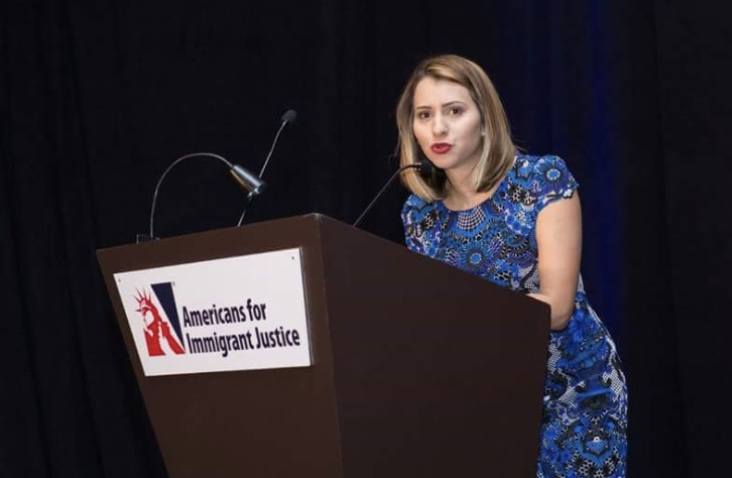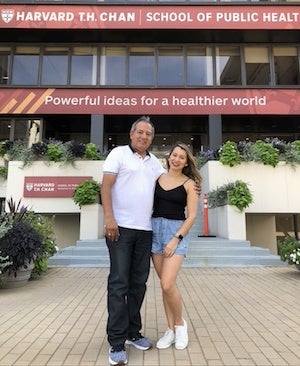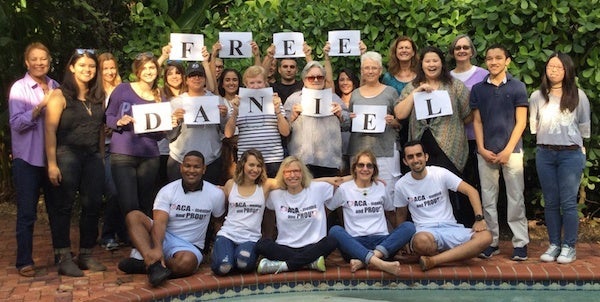A ‘Dreamer’ fights for health equity

DACA recipient Monica Lazaro, MPH ’21, is advocating for health policies that will help immigrants and others left behind
February 10, 2021 – At age 9, Monica Lazaro got the news every child dreams about: Her family was going to Disney World. When she arrived at the airport in her native Honduras, however, it seemed strange that everyone she knew was there. “My grandma was crying and I remember telling her I’d bring her a plush Minnie Mouse and everything would be okay,” Lazaro says. It was only years later, living in Miami, that she pieced together the truth: Her father had been robbed at gunpoint inside his clothing store in San Pedro Sula and the family had fled the country’s rising gang violence for Florida. She also found out that, after overstaying their visas, they had become undocumented immigrants.
“They just kept playing like we were going to Disney World,” Lazaro says. “I think I was 12 when we finally went.”

Lazaro’s experience living an undocumented life in the U.S. eventually led to her choosing a path aimed at helping others like herself. An MPH-65 student in health policy at Harvard T.H. Chan School of Public Health, Lazaro came to the School in 2019 as a so-called “Dreamer”—a childhood immigrant who has been allowed to temporarily stay and work in the U.S. through the Deferred Action for Childhood Arrivals Program (DACA). Her focus is on issues of health equity and she is especially interested in finding ways to help immigrants and others who face barriers to affordable health care. “My dream is to transform lives by addressing policies that affect health on a national scale,” she says.
By the time Lazaro understood her family’s situation in Florida, their lives had completely changed. While her parents had been small business owners in Honduras, in Florida her mother cleaned houses and her father solicited construction jobs in a Home Depot parking lot to support her and her two brothers. When she was 16, her mother was diagnosed with terminal colon cancer and Lazaro saw firsthand how she struggled to obtain insurance to afford the medicines she needed. While Lazaro had always wanted to be a doctor, the experience made her realize that she could potentially have greater impact addressing health inequity on a larger scale.
After her mother passed away three years later, Lazaro was able to obtain DACA status with the help of an attorney. “I know what it feels like to be protected—and I also know what it feels like to not be protected, to drive out of your driveway every day without a license, or see a cop pass by and think they are going to profile you and arrest you,” she says.
Lazaro earned an associate’s degree in biology at Miami Dade College and her bachelor’s in the same subject at Florida International University. After stints managing medical research trials at a Miami hospital and two Florida universities, she came to Harvard Chan School, where she has learned about the complex world of health policy and the various stakeholders—lobbyists, corporations, grassroots organizations, voters—involved in crafting legislation. “When you understand what’s behind the curtain, it starts to make sense why change is so incremental,” she says. Last spring, as a public health fellow for state senator Joanne Comerford at the Massachusetts State House, she researched a proposed health equity bill that would require any new legislation to include a statement evaluating its health impacts on the state’s lowest-income communities.
When the coronavirus outbreak temporarily closed the State House, Lazaro began a virtual practicum with Community Care Cooperative (C3), a network of community health centers for Medicaid recipients in Massachusetts. There, she helped push a budget request in the state legislature for funds for community health care centers across the state to deliver telemedicine during the pandemic. She argued that the funds would help eliminate health disparities by increasing remote access for low-income families during the pandemic. In December, the legislature approved half a million dollars for the initiative. “It was definitely exciting,” says Lazaro, who barely paused to savor the victory, thinking, “How can I do this on a bigger scale? How can I do this for the country?”

In addition to her work on health care, Lazaro has also advocated for the continuation of DACA, which was under threat during the Trump Administration. In 2017, she founded the #HereToStay Postcard Party campaign to flood the offices of state and federal politicians with thousands of postcards attesting to the difference the program has made in the lives of young people like her. Her efforts earned national attention—on television news programs, in stories in The New York Times and The New Yorker, and in a book about next-generation activism by Rep. Debbie Wasserman Schultz (D-Fla.).
On his first day in office in January, President Biden signed a presidential memorandum directing the Department of Homeland Security to protect and preserve DACA and proposed legislation to create a path to citizenship for beneficiaries of the program. Lazaro is hopeful for more permanent legislation. “In the past, executive orders have been used by both Republicans and Democrats to play politics with ‘Dreamers,’” she says. “I believe it is time for Congress to act—and the votes are there. It may be now or never, because 2022 may look very different.”
In the future, Lazaro hopes to advocate on the federal level for health care access for everyone, including undocumented immigrants. “We saw how important this was with COVID and frontline workers,” she says. “If the person who cleans the hospital or the school gets sick, then everyone gets sick.”
Like her family, she says, most immigrants come to the U.S. determined to work hard and give back to their adopted country. She hopes to steer the national conversation away from policies that pit citizens against immigrants, and help the two groups find common ground in their shared humanity. “If you go to any household in Ohio, California, New York, Florida, you’re bound to find someone who is having issues with access to health care,” she says. “We all just want to make sure our family member gets the best care—so let’s sit at the table and let’s talk.”
Photos courtesy Monica Lazaro


